Events
PAST EVENTS
Friday, March 17, from 11 a.m. to 7 p.m.
Queer week at Bétonsalon - Center for Art and Research
Queer Week is a festival which implements conferences, workshops, debates, projections, exhibition and discussion around questions of gendre and sexuality every year in Paris. Years after years, it has become a necessary and important platform in the process of making heard voices of speakers coming from different backgrounds. For each of its occurrences, scholars, activists and artists are invited to talk about their research, knowledge,experiences and productions.
11h-13h / Queer, Medias, Series
Speaker Nadia Ahmane, will analyze queerness in TV series in a one hour Pop conference, & Nelly Quemener, researcher in sociology of mass media will analyze queerness in media and popular culture.
14h-15h30 / Post-porn : for positive sexualities
With Florian Vörös, bruce et Sarah de Vicomte. Organised in partnership with Garçes, in the framework of a cycle on sexualities.
16h-17h / “Traduire en cuir”
Conference by Christopher Larkosh (UMass Dartmouth)
17h30 – 19h / Globalization, Neoliberalism and Precariousness
Through the perspective of a reflexion on globalization, neoliberalism and precariousness, Jules Falquet will present his latestbook; Pax neoliberalia, Sam Bourcier will talk about his upcoming book The Triangle and the Unicorn as Barabara de Vivo and Roger Fiorilli will focus on fighting strategies implementing in transfeminist Italian movement against precariousness.
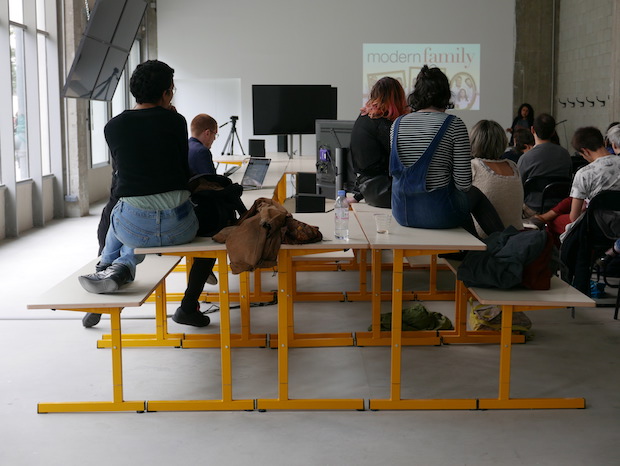
- Queer Week at Bétonsalon - Center for Art and Research – Friday, March 17, 2017.
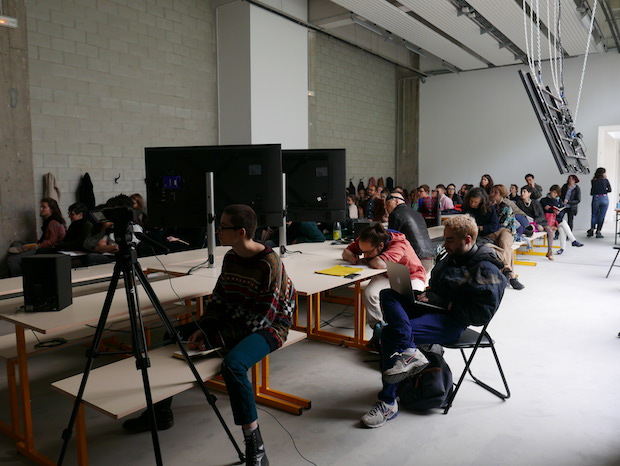
- Queer Week at Bétonsalon - Center for Art and Research – Friday, March 17, 2017.
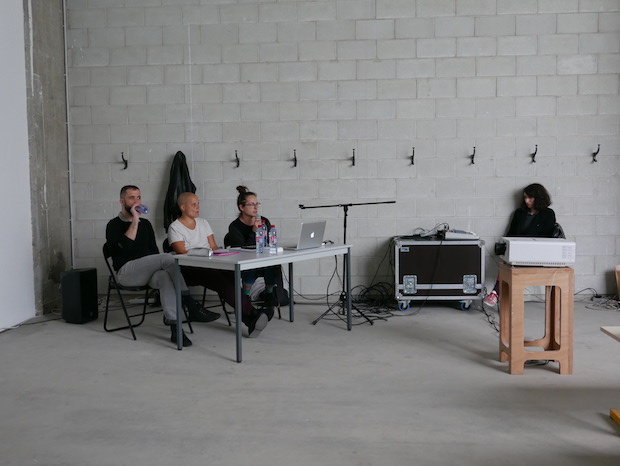
- Queer Week at Bétonsalon - Center for Art and Research – Friday, March 17, 2017.
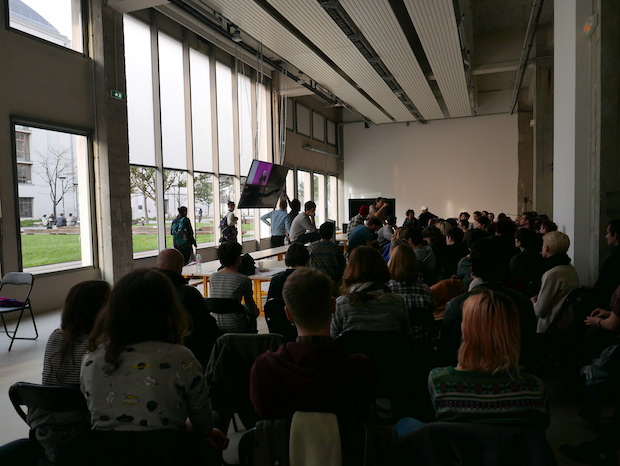
- Queer Week at Bétonsalon - Center for Art and Research – Friday, March 17, 2017.
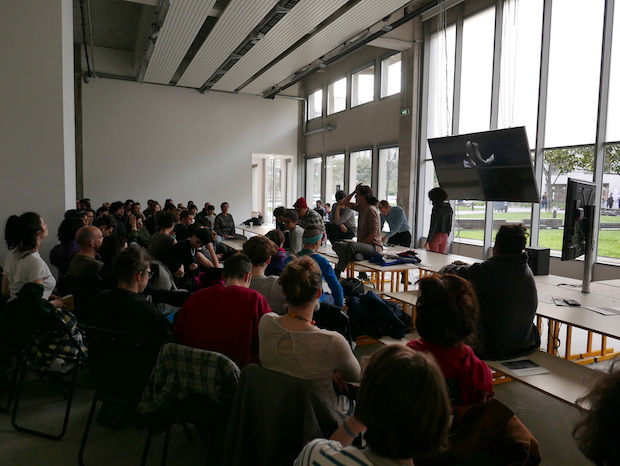
- Queer Week at Bétonsalon - Center for Art and Research – Friday, March 17, 2017.
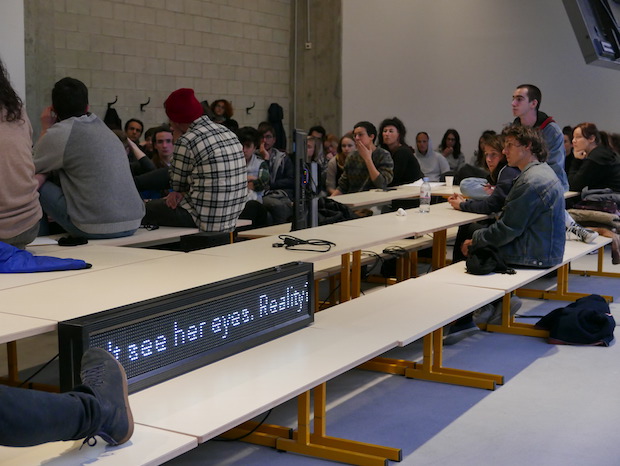
- Queer Week at Bétonsalon - Center for Art and Research – Friday, March 17, 2017.
Saturday, March 25, from 3 p.m. to 4 p.m.
Livestream of the discussion between Donna Haraway, Rosi Braidotti & Fabrizio Terranova organised by the Stedelijk Museum, Amsterdam and Utrecht University
In English.
More information here
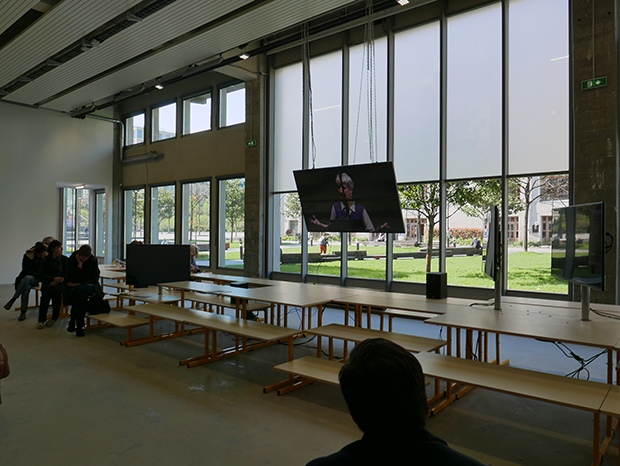
- Livestream of a discussion between Donna Haraway and Rosi Braidotti organized by Stedelijk Museum – Amsterdam, at Bétonsalon - Center for Art and Research, Saturday, March 25, 2017.
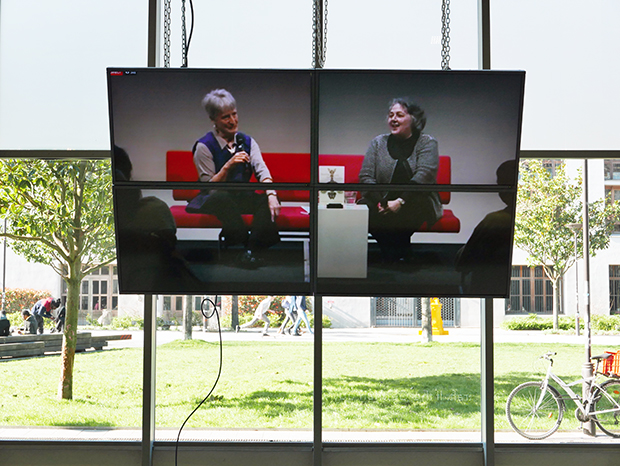
- Livestream of a discussion between Donna Haraway and Rosi Braidotti organized by Stedelijk Museum – Amsterdam, at Bétonsalon - Center for Art and Research, Saturday, March 25, 2017.
Friday March 31, 5pm
Ukraine: Contemporary & Feminist Art as a response to social challenges
Bétonsalon – Center for Art and Research welcomes Lesia Kulchynska and Oksana Briukhovetska from the Kiev Visual Culture Research Center for a debate on contemporary and feminist art. The discussion will be in English.
Revolutions, war: the last 10 years have been a period of strong social changes in Ukraine. Politics are back on stage: with, on one side, the strengthening the extreme right discourse and on the other side the development of feminism, of the LGBT movement and of civil society.
Since the first revolution in 2004 contemporary art in Ukraine has become socially and politically engaged.
After Maidan revolution (2013) now with the war, art actively reacts to traumatic social experiences. The questions of women and migrants rights, in particular, are exacerbated.
Lesia Kulchynska will speak about artistic strategies emerging in response to the difficult social reality and will explain how violence and censorship intervenes into the cultural sphere.
Oksana Briukhovetska will contextualize feminist and gender topicalities in the art field and society in general, providing a comparative perspective on the current Ukrainian situation together with other post-Soviet and Eastern European countries.
The Visual Research and Culture Centre of Kiev is one of the first independent cultural and artistic centers in Kiev, it is the organizer of the Kiev Biennale in 2015. It has organized several openly feminist exhibitions since its opening in 2008.
This workshop is organized in partnership with the Visual Research and Culture Center and Alternatives Européennes, a transnational association that advocates for ’equality, democracy and culture in Europe’, which aims to bring together citizens, artists, curators, Intellectuals across Europe to create a democratic and open Europe. The association organizes artistic, cultural and political events including the biannual TRANSEUROPA festival in the European Union and beyond.
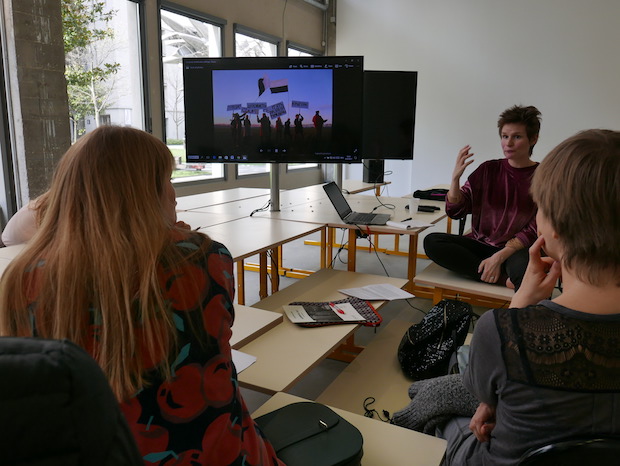
- Ukraine: Contemporary & Feminist Art as a response to social challenges – at Bétonsalon - Center for Art and Research, Friday, March 31, 2017.
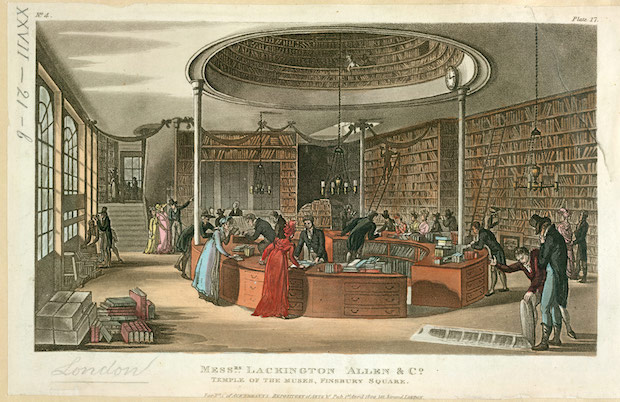
- Rudolph Ackermann – Temple of the Muses, Finsbury Square, 1809, print.
Saturday April 29, 2017. From 2.30pm to 5.30pm
Workshop: Attempting to exhaust an impossible theory*, by Colophon
*The theory of reading artists’ books
To register and/or get further information on the event, please write to info@betonsalon.net
Object: Atelier Colophon
“The way they are meant to be seen, is obviously when someone hands someone else a book, at moments and places that weren’t expected “
Ed Ruscha
Facing the political uncertainties of our time in a period preceding elections, a workshop will take place within the exhibition space of Bétonsalon – Center for Art and Research. It will build on the pieces of furniture displayed in Emmanuelle Lainé’s installation. Starting from a selection of books coming from Colophon and from Katinka Bock’s Shared Letters (a collection of books hosted by Bétonsalon) the workshop “Attempting to exhaust an impossible theory*” offers (an attempt of) theorization through several actions, such as reading or the individual use of artists’ books. We aim at unveiling a broad field of possibilities at an individual scale.
This workshop has been thought as an oppositional public space (Oskar Negt, L’espace public oppositionnel, Payot, 2007) during which participants will be invited to think of ways of appropriating books that will be shared on this occasion. So as to create a specific eco-system based on sharing, participants are asked to bring recording and/or publishing devices allowing them to interact with books: printers, paper, cameras, voice recorders, computers, and so on.
About Colophon:
Colophon is a semi-itinerant library dedicated to self and independent publishing in the field of visual art. The project is carried by Frédéric Blancart. As expressed by the word “Colophon”, our project aims at providing a panoramic view of editorial practices in visual arts. Since its opening in 2016, Colophon organized public discussions at Mains d’Oeuvres (Saint-Ouen) during which artists, editors and curators were invited to discuss and debate aesthetic and economic issues regarding micro-editions.
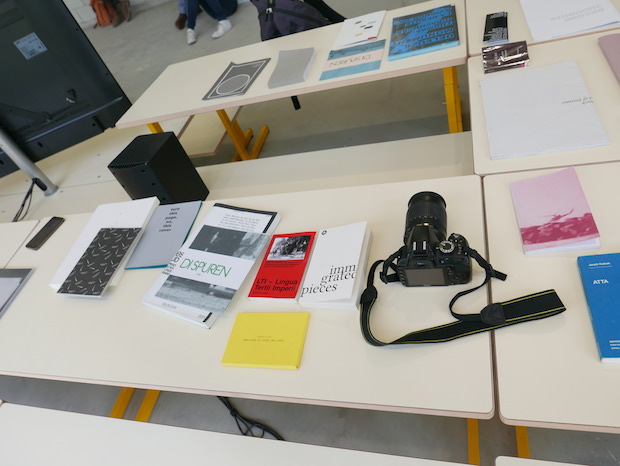
- Workshop: Attempting to exhaust an impossible theory* – by Colophon at Bétonsalon - Center for Art and Research, Paris, 2017.
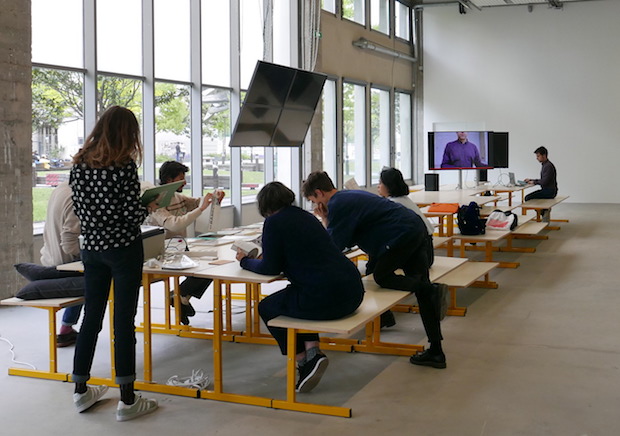
- Workshop: Attempting to exhaust an impossible theory* – by Colophon at Bétonsalon - Center for Art and Research, Paris, 2017.
Saturday May 6, from 3pm to 6pm
Courage! Hegel & politics today.
A conversation with Frank Ruda
The conversation will be in English
On the eve of a major democratic choice, Bétonsalon – Center for Art and Research wishes to convene an alternative space for debate and exchange. We are happy to invite Frank Ruda for a conversation. He is a philosopher and one of the most incisive political thinkers of today, notably addressing and re-defining concepts of courage, fatalism, and freedom.
Courage! Hegel and Politics Today
On average, one might think twice before asking a philosopher what to do, especially in politics. And philosophers therefore seem to have been justifiably and famously chided by Marx for being lost, not in translation, but in their own interpretations that never actually changed anything (except previous interpretations). Yet, if one actually starts browsing through the history of philosophy, it is harder to find those only-interpreting philosophers that Marx attacked than one would have imagined. Most of them were engaged in one way or the other in a political movement, were advocates a political system, or proponents of their very own political, sometimes utopian agenda. With at least one – maybe there are more –exception: the one philosopher who claimed philosophy’s job is no other than just to understand its own time as it is (and “apprehend it in thought”), that is, Hegel. Yet and strangely, despite Hegel’s own insistence that philosophy has no other job than to think what is, by some of his heirs he was attacked for having been a mere apologist of the Prussian state, by others (surprisingly Lenin is one of them) he was the one to return to when all hitherto attempts for collective emancipation and revolution failed. Some of the questions that the lecture and the discussion will be addressing are the following one: Is there anything still to be learnt or to be retained from Hegel? Does he have anything to tell us today – anything that might be of political (or other) contemporary relevance?
Frank Ruda is currently professor for social philosophy at the Goethe-University Frankfurt am Main, Germany and co-editor of the journal “Crisis and Critique”. His most recent publications include: The Dash – The Other Side of Absolute Knowing (with Rebecca Comay)(MIT Press, 2017); Reading Marx (with Agon Hamza and Slavoj Zizek (Polity Press, 2017); Abolishing Freedom: A Plea for A Contemporary Use of Fatalism (Nebraska UP, 2016). He will be discussing with Oliver Feltham; Professor of Philosophy at the American University of Paris
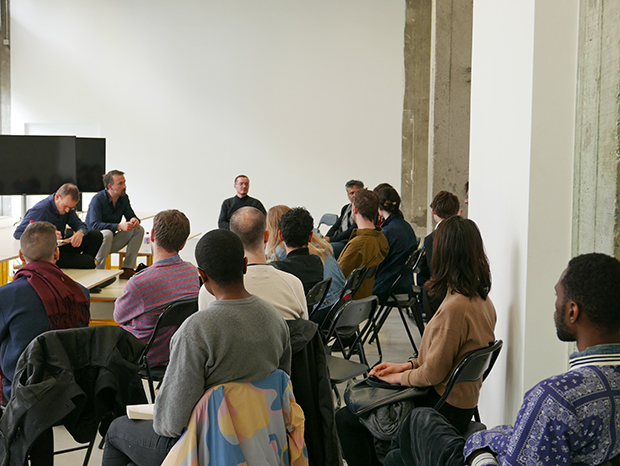
- Meeting between Frank Ruda and Oliver Feltham – at Bétonsalon - Center for Art and Research, Paris, 2017.
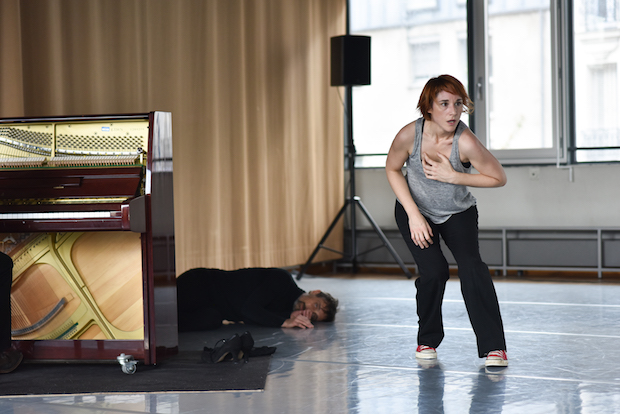
- La Théorie du crocodile – image : Gil Lefauconnier.
Wednesday May 10, from 4.30 to 6.30 pm– 5/10 years (parents can join
Dance workshop with Les Ouvreurs de Possibles
In partnership with Théâtre Dunois
As part of the PIC festival (Par Ici la Culture / Culture this way)
The crocodile (put if differently, our reptilian brain) is this part that protect us and defends our need. This workshop, elaborated in relation with the performance on the Theory of the Crocodile, proposes that the inner movements be explored through gestures linked wit emotions and animality, through the crocodile’s attitude.
Free workshop – Registration with the theatre at the following number or email address:01 45 84 72 00 or lealombardo@theatredunois.org
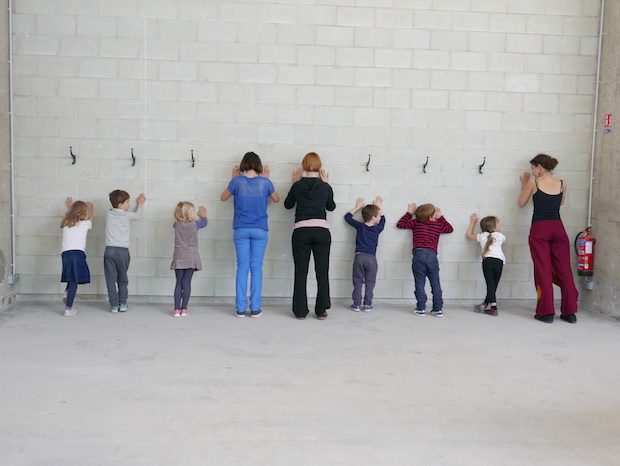
- Dance workshop with Les Ouvreurs de Possibles in partnership with Théâtre Dunois – at Bétonsalon - Center for Art and Research on May, 2017.
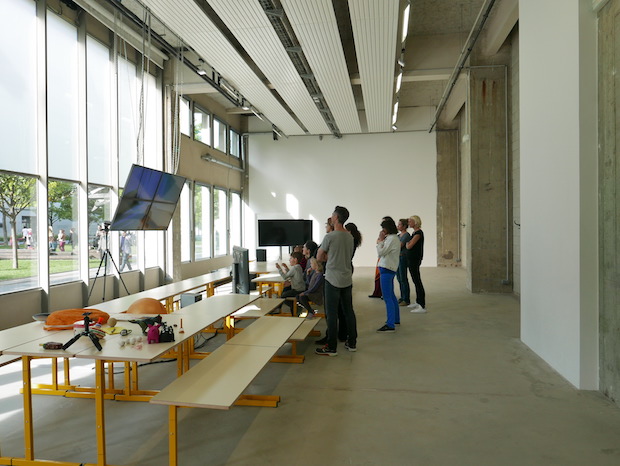
- Dance workshop with Les Ouvreurs de Possibles in partnership with Théâtre Dunois – at Bétonsalon - Center for Art and Research on May, 2017.
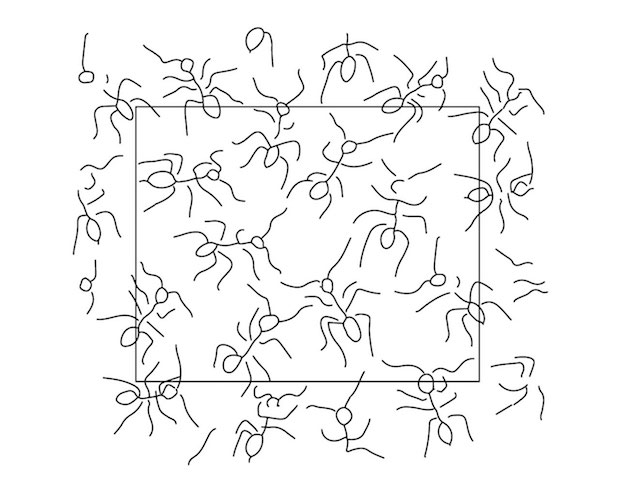
Opening on Wednesday May, 17, 2017 from 6 to 9 pm.
Exhibition from Wednesday, May 17 to Saturday, May 20, 2017.
The Whole is Always Smaller than its Parts
We’re overtaken by events.
Curated by Olivier Bémer and Elsa Michaud
For the second time, Claude Closky’s students will display their works at Bétonsalon – Center for Art and Research for a short exhibition within the exhibition.
Emmanuelle Lainé allowed the artists to take over the exhibition space by responding to her installation Incremental Self: Transparent Bodies.
With: Chadine Amghar, Olivier Bémer, Clément Bleu—Pays, Kim Bradford, Inès Dobelle, Margot Douay, Jonás Fadrique, Elias Gama Paez, Manon Gignoux, Nastassia Kotava, Cham Lavant, Elsa Michaud, Martin Poulain, Sacha Rey, Matthew Young Chan Junn, Yann Yue Yuan
Bétonsalon – Center for Art and Research invited three groups of researchers and artists to propose a series of public programs dedicated to the multiplicity and fragility of contemporary identities. Each event will take place within Emmanuelle Lainé’s exhibition Incremental Self: Transparent Bodies.

Saturday, June 3, 3 – 6 pm
WeTransfer: Diasporic and Situated Knowledge
Drawing from the concept of the carnivalization of identities, artists Jean-François Boclé, Tarek Lakhrissi, Nathalie Muchamad and Mükerrem Tuncay will discuss concepts of disidentification, creolization and carnival, elaborating on their own video works.
Tarek Lakhrissi will talk about films and texts addressing language and poetry as utopias necessary to find oneself.
Mükerrem Tuncay will present the video Great Depression; a metaphorical means to address her “foreign” status.
Nathalie Muchamad will talk about the syncretism of the Indonesian context, wondering whether it can be perceived as a space for reflection similar to the creolization process undergoing in the French Caribbean.
Jean-François Boclé will screen dialogo 1, AS.SAU.PA.MAR. Akiyo y Voukoum, a film made with the artist Mina Biabiany (unity IS SUBMARINE) in February 2017 in Guadeloupe, during the Carnival.
This round table will be punctuated by two short videoconferences:
Claire Tancons, curator, based in New Orleans (Louisiana, United States of America), will comment on her curatorial practice.
The MEMORIAL ACTe, Caribbean Center of Expression and Memory of Slavery and Slave Trade based in Pointe-à-Pitre, will comment on its action and focus on the function of carnivals within the Guadeloupean Caribbean-French society.
Jean-François Boclé (b. 1971 Martinique) Based in Paris. Graduated École Nationale Supérieure des Beaux-Arts of Bourges and École Nationale Supérieure des Beaux-Arts of Paris. He develops a practice which questions the bipolarity of the postcolonial globalized world, oscillating between violence, toxicity, racialization or gentrification and the possibility of We. He exhibited recently in the CCK (Buenos Aires), ILHAM Gallery (Kuala Lumpur), Para Site (Hong Kong), Saatchi Gallery (London), Queens Museum (NYC). He participated to eleven international Biennials.
Tarek Lahrissi is a visual artist, based in Paris. Now graduate in MA from Université Sorbonne Nouvelle, Tarek Lakhrissi did an international exchange at University of Montreal, completing a Master’s degree in Art History/Theatre Studies. His research subject was about intersectionality, disidentification (Muñoz) and performance art through Adrian Piper and Darkmatter’s work. He directed a video project diaspora/situations (2016, Prix Spécial du Jury - Documentaire, Festival Transposition) about people of color reflecting on the impact of diasporas on their bodies and their affects. He writes poetry and develops visual content aiming to challenge language and reflect upon identity. He also works as a bookseller in the center of Paris.
Nathalie Muchamad (b. New-Caledonia) Based in Paris and Lyon.
Her research focuses on fiction as a place where the making/manufacture of memory is possible/becomes a possibility. Make and inject with memory. Exhibition: Villa Vassillieff , Tomorrow is an island , Paris. 2016. Institut Français, Des Mondes Parallèles. Curator Georges Rey & Néon Centre d’art. Tunisia. 2016. Le Magasin CNAC Grenoble, 2014. Solo show 2016: Halle de Pont-en-Royans. Upcoming: Biennal of Lyon 2017 and Espace-Projet Residency, Montréal, Canada , 2017.
Mükerrem Tuncay (b. 1987) lives and works in Lyon, France where she graduated from the École Nationale Supérieure des Beaux-Arts in 2013. Her recent group exhibitions are Potnia Theron, Altana Galerie, Dresden (2016); Casting the circle, Galerist, Istanbul (2016); Clicks & Bricks I, Galerie Christophe Gaillard, Paris (2016); Après avoir tout oublié, Friche Belle de Mai, Marseille (2015). She was the recipient of the Prix Ville de Grenoble (2013) and Anna Lindh Foundation (2009) awards.
Claire Tancons, trained as a curator and art historian, she practices curating as an expanded creative field akin to directing and experiments with the political aesthetics of walking, marching, second lining, masquerading and parading.
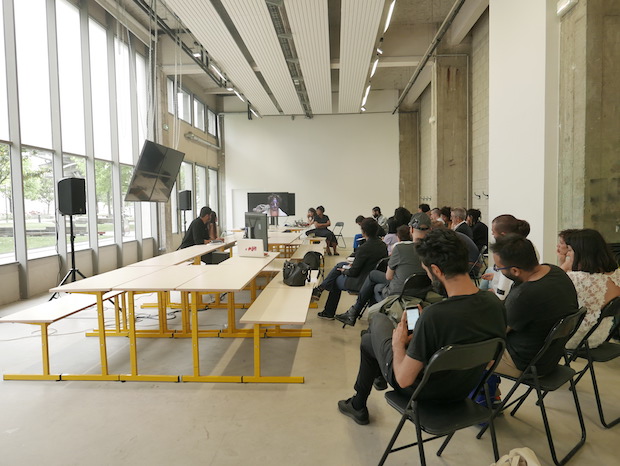
- "WeTransfer: Diasporic and Situated Knowledge" – on Saturday, June 3, 2017, at Bétonsalon - Center for Art and Research.
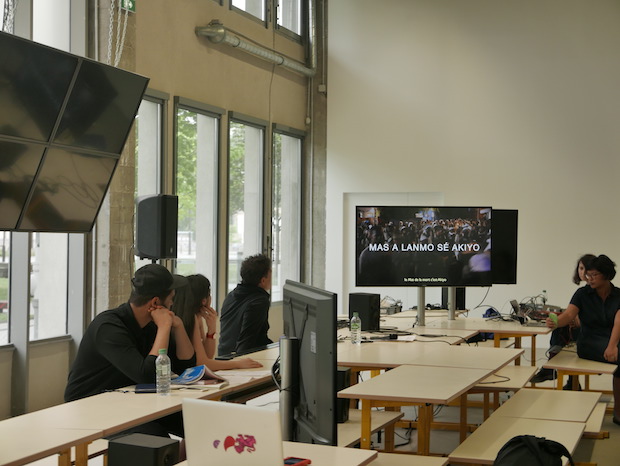
- "WeTransfer: Diasporic and Situated Knowledge" – on Saturday, June 3, 2017, at Bétonsalon - Center for Art and Research.
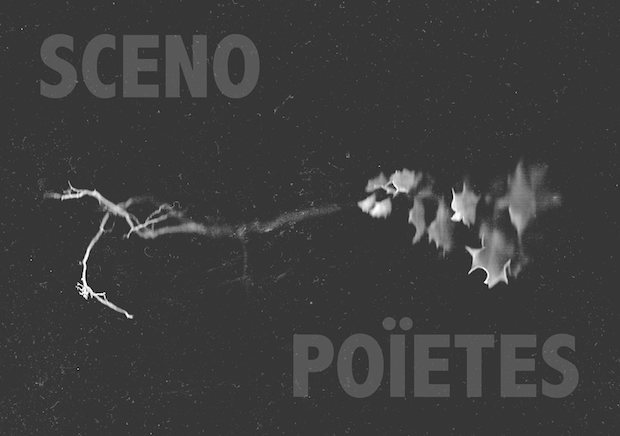
Thursday, June 6, 5 pm – 8 pm
Scenopoïetes
Creation workshop Maison centrale de Poissy / Paris Diderot University
Under the direction of Julie Ramage
Screening of the works made during the workshop and launching of the publication.
As part of the Académie vivante (Living Academy), convict students from Poissy prison have been invited to remotely collaborate with undergraduate Letters students for a writing workshop focusing on the question of earth/territory.
What is the difference between earth -its organic composition, its biological and geological history, its botanical specificities- and territory; which entails notions of borders and of collective narratives? How to consider of the prison “territory”; a space that has been civically, socially and economically distanced from the rest of society? What can we learn from a scientific study of its ground? What can we learn by reflecting on the modes of territorialization which have been borrowed by the convicts – such as the cultivation of parcels within the prison?
How the the experience and skills of each of the participants may enrich the dialogue?
This project has been organized as part of the Ateliers des Lettres from the URF Lettres, Arts, Cinéma and by the Section for Convict Students of Paris-Diderot University. It has been supported by the Centre d’Études et de Recherches Interdisciplinaires en Arts Cinéma (CERILAC), from Paris Diderot University, by the Service d’Accompagnement aux Pédagogies Innovantes et à l’Enseignement Numérique de Sorbonne Paris CIté (SAPIENS-USPC), by the Service Pénitentiaire d’Insertion et de Probation (Yvelines region), and by DRAC Ile-de-France.
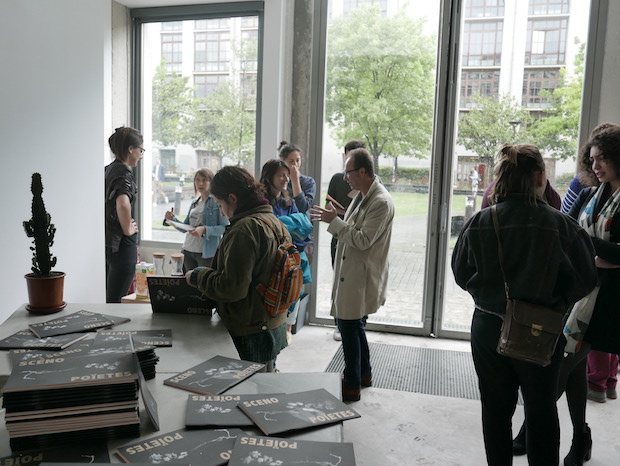
- Launching of the publication "Scenopoïetes" – on Tuesday, June 6, 2017 at Bétonsalon - Center for Art and Research.
Wednesday, June 7, from 7 pm onwards
Performances & recital as part of the Nio Far Festival.
Reading-performance “Sucre Amer”, by Françoise Vergès & Sylvie Robic:
Talking about sugar as a component of daily life, Françoise Vergès & Sylvie Robic will trace its link to slavery, to European literature, capitalism, consumption, sexuality and advertising.
Followed by a performance by Jephthé Carmil & recital by Claude Saturne .
Find the full programmation of Nio Far festival here.
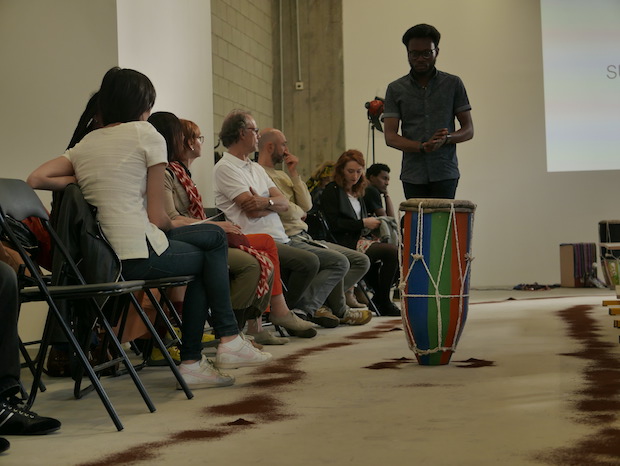
- Jephté Carmil’s performance – on Wednesday, June 7, 2017, at Bétonsalon - Center for Art and Research, as part of the Nio Far Festival.
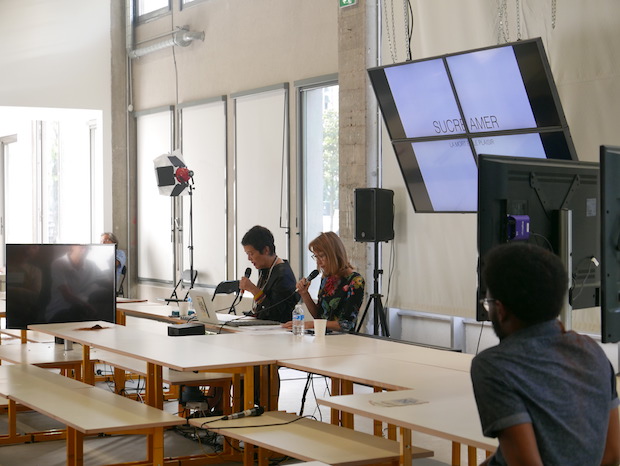
- Françoise Vergès and Sylvie Robic’s reading performance – Sucre Amer, on Wednesday, June 7, 2017 at Bétonsalon - Center for Art and Research, as part of the Nio Far festival.
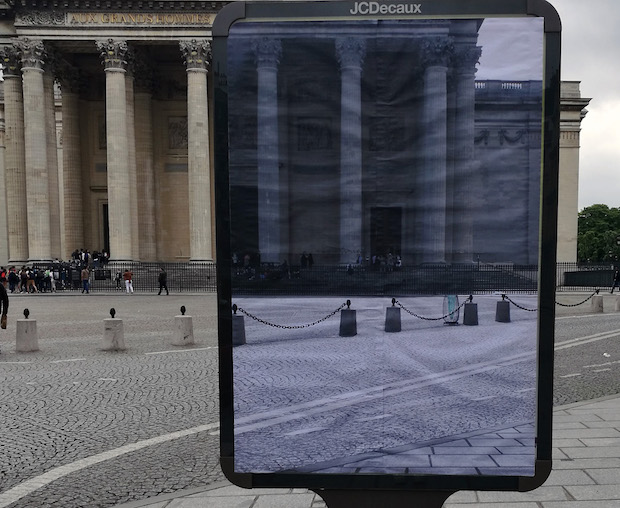
- Iris Le Mée – Panthéon, 2017.
Wednesday, June 14, 11 am – 7 pm
Leaving the workshop
Presentation of the fine art works made by the 2nd year students of ENSA Paris-Val de Seine. Teacher: Guillaume Meigneux
For one semester the students had to invest several public spaces generating disturbances, transforming meaning, causing accidents that allowed to shed a new light on these places.
These interventions could have been executed through performance, installation, or drift stemming from a close, attentive reading of the site.
What will be presented are the remaining traces of these interventions, their formal, visual sedimentations, which, by being juxtaposed in the exhibition space will give shape to a new fiction creating new situations.
With works by: César Alterio, Héloïse Bocher, Charles Elias Boudlal, Sophie Branchereau, Camille Chaboud, Melis Sila Cicek, Arthur Clément, Valerio Costa, Morgane Cozic, Constance d’Espinose de Lacaillerie, Thomas de Chavigny, Pauline de la Morinerie, Marcela Agda de Vincenzo Brandolin, Alexandre Gendry, Raphaël Guerrier, Coline Hennequin, Audrey Kac, Sarah Khodri, Iris Le Mée, Elisa Leymarie, Alexandra Mallah, Raphaëlle Mola, Antoine Monjou, Romane Pauchet, Martin Perraudeau.
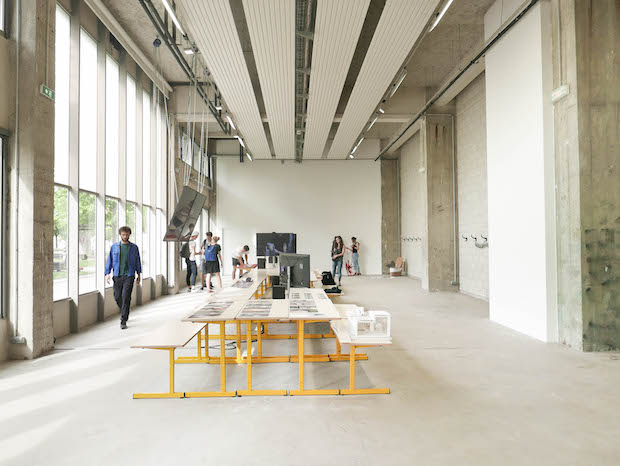
- "Leaving the workshop" – presentation of the works made by the 2nd year students of ENSA Paris-Val de Seine, on Wednesday, June 14, 2017, at Bétonsalon - Center for Art and Research.
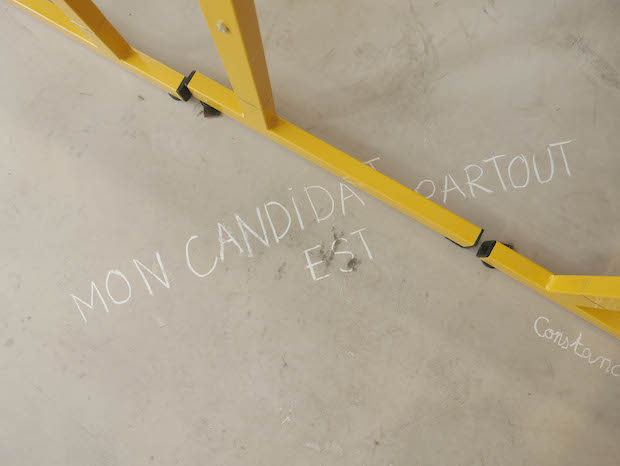
- "Leaving the workshop" – presentation of the works made by the 2nd year students of ENSA Paris-Val de Seine, on Wednesday, June 14, 2017, at Bétonsalon - Center for Art and Research.
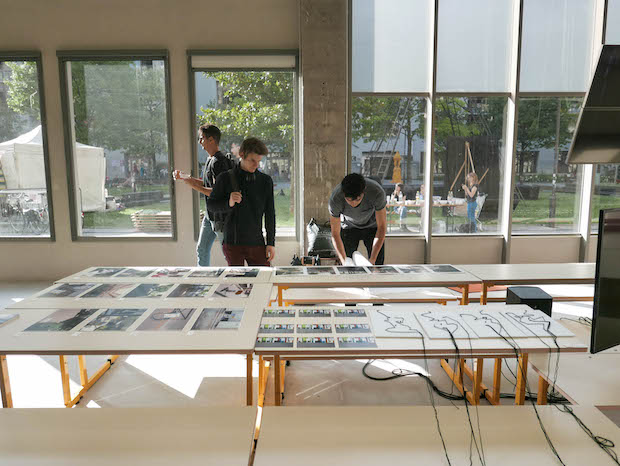
- "Leaving the workshop" – presentation of the works made by the 2nd year students of ENSA Paris-Val de Seine, on Wednesday, June 14, 2017, at Bétonsalon - Center for Art and Research.
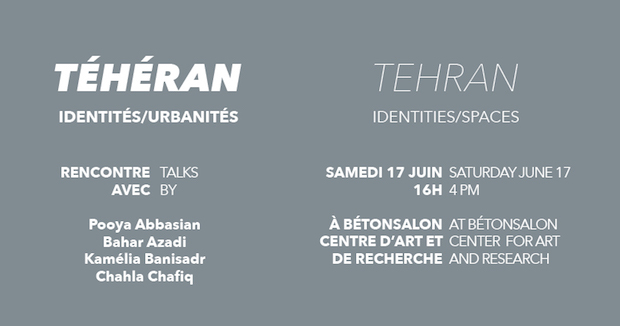
Saturday, June 17, 4 pm – 6 pm
Tehran: identities/spaces
A program by Pooya Abbasian and Clémentine Proby
Bétonsalon – Center for Art and Research invited three groups of researchers and artists to propose a series of public programs dedicated to the multiplicity and fragility of contemporary identities. Each event will take place within Emmanuelle Lainé’s exhibition Incremental Self: Transparent Bodies.
In Teheran, spaces brand bodies and divide up identities. The transition from private to urban and public spaces first produces a physical effect. Social interactions too are affected by it. Suspicion is common; it characterizes the extreme dichotomy which keeps apart private and public life.
Yet, the citizens whose rights are repressed (women, laypersons, members of ethnic, religious or sexual minorities) imagine strategies to juggle with a restrictive urban space that lacks tolerance. Citizens lastingly mark the city through their practices, movements, and interactions. The environment builds up and takes on new meanings under the influence of people roaming through, lingering, and meeting up in the streets.
What are these strategies and where are they implemented? Can we identify transitional spaces for these plural identities? How do the latter affect urban space? How did these split identities intensify among Tehran minority communities?
Through a corpus of films, videos, and photographs, artists and academics will address the dichotomy between private and public life, stressing on their own experiences and fields of expertise, focusing on some existing places in Tehran that crystallize this tension, and on the representation of identities in the specific context of public space.
With: Pooya Abbasian (artist, collaborator of Jafar Panahi), Bahar Azadi (PhD researcher in philosophy, Paris Descartes University), Kamelia Banisadr (artist), and Chahla Chafiq (writer and sociologist).
Event moderated by Clémentine Proby.
Chahla Chafiq is a writer and sociologist. She was born and grew up in Iran. After having actively participated in the Iranian Revolution, her opposition to the Islamist regime forced her into exile. She has been living in France since 1982, where she completed her sociology studies. Her PhD thesis, which addressed questions of political Islam and gender, received Le Monde award for academic research.
Chahla Chafiq writes in French and Farsi. She has been actively supporting movements for human rights and women’s freedom. She is the co-founder of the International network of solidarity with feminists in Iran (2007).
Kamelia Banisadr is an Iranian artist born in Teheran in 1989, who graduated with from the Paris-Cergy school of arts in 2017. After having worked for several months at the AZAD Art Gallery, Teheran, and after training with a mirror manufacturer, she developed a research focusing on shape and space in relation to the contemporary Iranian society, while finding inspiration in a tradition that she also transformed. She is looking for artistic ways of gathering individuals in a fragmented society.
Bahar Azadi is a PhD candidate in Philosophy at the Sorbonne Paris-Descartes University. She graduated in Sociology from the Allameh Tabatabaei University in Teheran, and in Urbanism from INSA in Strasbourg. Her thesis is entitled: The making of sexualized bodies. Transsexuality after the Islamic Revolution in Iran. She published articles in several journals; the last one will appear in Implications philosophiques.
Pooya Abbasian is a Paris-based artist and director born in Iran in 1983. Focusing originally on visual arts, his work was exhibited in various galleries and festivals in Tehran and abroad, casting an ironic eye on the patterns of “self-exoticism” among artists from the Middle East.
He now embraces a large range of media and practices. As a director and film editor, he collaborated closely with director Jafar Panahi, directed videos for several museums and bands like Birdpen and Abby (Universal Music). He recently published two children’s books, as author and illustrator: Un arbre pour ami (Gallimard, 2016) and Mes amis monstres (Actes Sud, 2017). Pooya Abbasian is currently working on a very personal photography/drawing project.
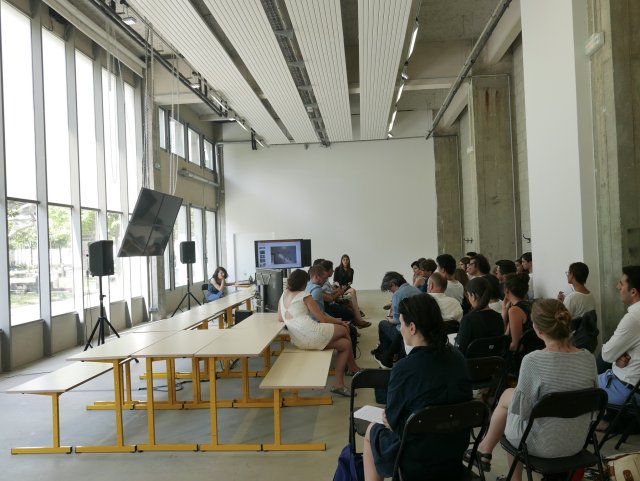
- "Tehran: identities/spaces" – on Saturday, June 17, 2017, at Bétonsalon - Center for Art and Research.
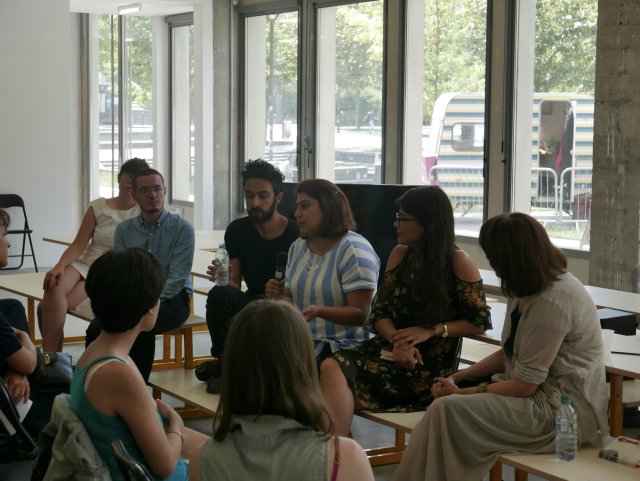
- "Tehran: identities/spaces" – on Saturday, June 17, 2017, at Bétonsalon - Center for Art and Research. With (from left to right): Pooya Abbasian, Kamelia Banisadr, Bahar Azadi and Chahla Chafiq.
Wednesday, June 21, 7 pm.
World Music Day, Vocal group “À Tire-d’Elles”
Renaissance and baroque English, French, Italian songs, Russian lullaby, Mozart’s canon, excerpt from Bach’s Magnificat, Poulenc’s melody….
The pleasure of learning meets that of the adjustment of harmony vocals from a varied repertoire, always performed a cappella.
“What is more powerless, vulnerable and hard to manage than an a cappella voice, intensely echoing our “fragile, precarious lives” or “the multiple, the collective, the incontrollable”?
Emerging from the depths of our bodies, seemingly escaping in a dematerialized breath as the expression of everyone’s unity and multiplicity, the voice seems to create, in the first place, its own transitional space, and to do without ancillary objects that prolong and increment the human.” (Valérie Mezger, DR CNRS, Paris Diderot University, UMR7216 Épigénétique et Destin cellulaire)
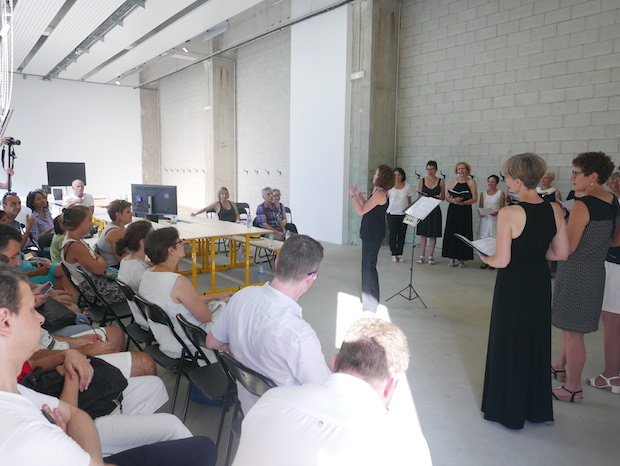
- World Music Day – vocal group “À Tire-d’Elles” on Wednesday, June 21, 2017 at Bétonsalon - Center for Art and Research.
Thursday, June 22, 5 – 7 pm
Theatre play Les Royaumes d’Automnes performed by La Fabryk.
Stage direction: Thilina Pietro Femino
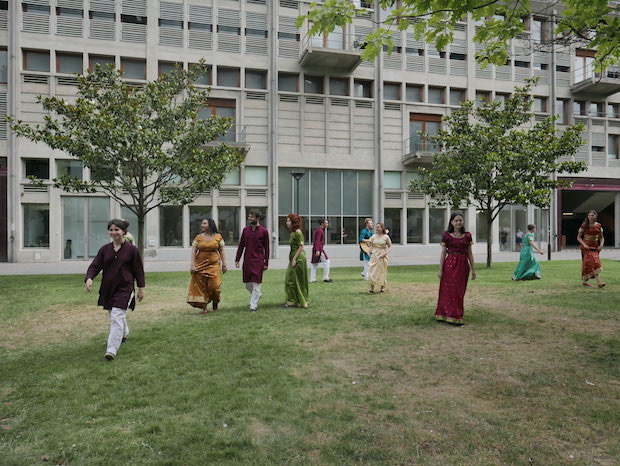
- "Les Royaumes d’Automne" – performed by La Fabryk on Thursday, June 22, 2017 at Bétonsalon - Center for Art and Research.
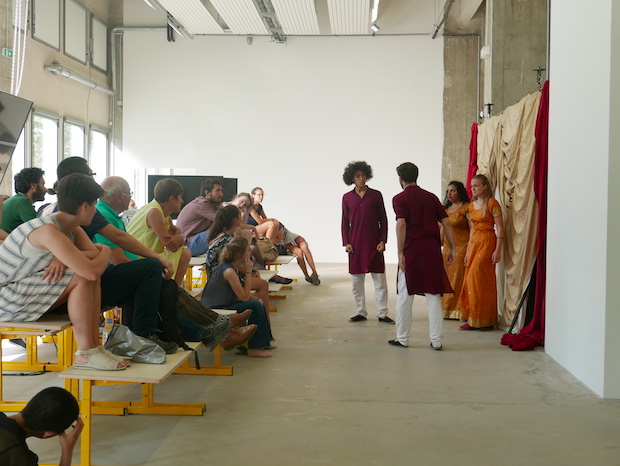
- "Les Royaumes d’Automne" – performed by La Fabryk on Thursday, June 22, 2017 at Bétonsalon - Center for Art and Research.
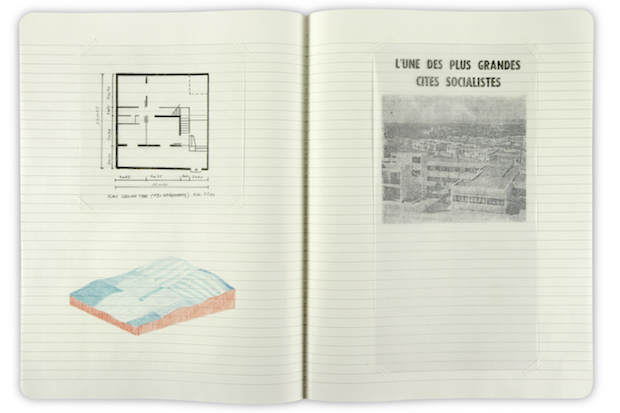
Friday, June 23, 11 am – 7 pm
Kibrit كبريت On the reactivation of our collective utopias and forgotten narratives
Through performances, readings, discussions, workshops and screenings, the KIBRIT research seminar organized at Bétonsalon - Center for Art and Research is conceived as a wide, fragmented narrative on the reactivation of our forgotten histories and collective utopias, particularly those that nourished the 1960s and 1970s in Morocco, Algeria and the region. Introducing modalities to reactivate histories and situations, the invited artists, researchers and curators share not only the willingness to give a new visibility to the too often forgotten narratives, years of fighting, utopias, ideals, and collective movements of the past, but also to investigate ways to reactivate these very ideals and values in the present and for the future.
With Marie Pierre Bouthier, Yasmina Reggad, Massinissa Selmani, Mohamed Fariji, Kenan Darwich and Omar Nicolas (Fehras Publishing Practices), Yasmina Naji and Nadine Atallah.
Screening of the films by Ali Essafi and Marwa Arsanios
KIBRIT (كبريت) is a collaborative research and production programme focused on artistic and curatorial practices engaged in reflections on processes of cultural and collective mnemonic reactivation.
11:00 / Francesca Masoero and Léa Morin “Kibrit: : reactivating our narratives and utopias”
Introduction to the research seminar and presentation of the projects developed by Kibrit’s partners.
11:30 / Marie Pierre Bouthier “Ali Essafi: inheriting the montage”
Ali Essafi focuses on Ahmed Bouanani’s practice, by re-establishing the possibility for an intergenerational cultural transmission notwithstanding the difficulties posed by colonial and post-colonial ruptures. In this vein, he continues Bouanani’s investigation for a cinema whose forms could reactive traditional oral practices. + screening of Wanted (2011, 24’) by Ali Essafi.
12:30 / Lunch
14:00 / Yasmina Reggad, “We dreamt of utopia and we woke up screaming”
Performance. Curatorial project for a platform dedicated to alternative histories, emerged from the little known archives of the Radiodiffusion Télévision algérienne, which gave voice to the fights, hopes and projects for the emergence of other futures during the 1960s and 1970s.
14:30 / Massinissa Selmani in conversation with Yasmina Reggad, 1000 villages
An artistic project focused on the agrarian revolution and on a real-estate project that considered the creation of 1000 socialist villages in Algiers at the beginning of the 70s.
15:15 / Mohamed Fariji, A Collective Museum for Casablanca
An artistic project for the creation of a local museum dedicated to the collective memory of the city’s districts (industrial heritage, amusement parks, schools, aquarium) in Casablanca.
16:00 / Break
16:20 / Kenan Darwich and Omar Nicolas from Fehras Publishing Practices, When the library was stolen
Research and publication on the library of the author and novelist Abd Al-Rahman Munif, a re-reading of the publication’s archive and publishing practices in the Eastern Mediterranean and North Africa during the 20th century.
17:00 / Yasmina Naji
MODERNITES NOMADES (Nomadic Modernities) is an ambitious editorial project co-directed by KULTE EDITIONS and ZAMAN BOOKS, which explores the unpublished archives of the Atelier (1971 - 1991) with the intention to re-read them in the broader context of a transnational and postcolonial history of arts.
17:40 / Nadine Atallah, Words as Silence, Language as Rhymes by Marwa Arsanios
Artist book conceived as a “re-edition” of the Egyptian cultural magazine Al-Hilal, by playing with the visual and ideological language of the Nasser era + screening of Have You Ever Killed a Bear? or Becoming Jamila (25min, 2014) by Marwa Arsanios.
18:30 / Open discussion
+ Aperitive drinks
A proposal conceived by Léa Morin (Atelier de l’Observatoire) and moderated by Francesca Masoero (LE 18, Kibrit coordinator)
KIBRIT is a program directed by LE 18 (Marrakech), Atelier de l’Observatoire (Casablanca), Rhizome (Algier), Maison de l’Image (Tunis), Ramallah Municipality, in partnership with JISER and CeRCCa (Barcelona). It takes the form of shared researches, cartographies, artistic interventions, residencies, exhibitions, conferences, screenings, publications and a web platform.
KIBRIT presents a series of resources and surveys aiming at crossing knowledges and practices and taking the form of commissioned texts and interviews with thinkers, curators and artists tackling our past, present and future relationship (as citizens, intellectuals, artists) to history, memory and the multiple challenges of our contemporary societies (such as education, social and political engagement, ecology, urbanity, etc).
Kibrit is funded by SouthMed CV, a programme initiated by Interarts, BAC Art Center, Gudran for Art and Development, Khayal Arts & Education, National Center for Culture and Arts and the German Commission for UNESCO. The programme is co-funded by the European Union within the framework of the regional programme Med Culture.
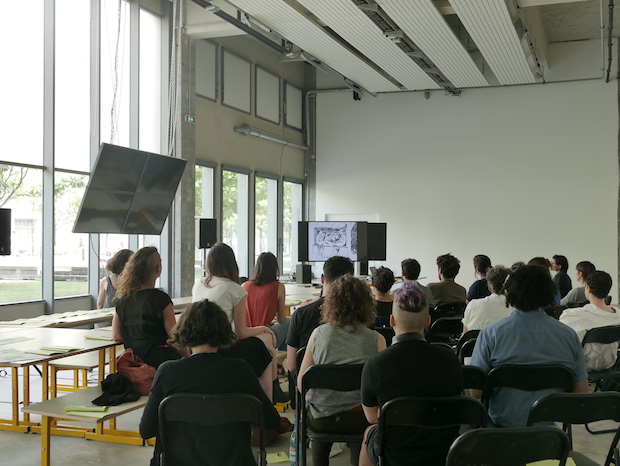
- Study day "Kibrit كبريت On the reactivation of our collective utopias and forgotten narratives" – on Friday, June 23, 2017 at Bétonsalon - Center for Art and Research.
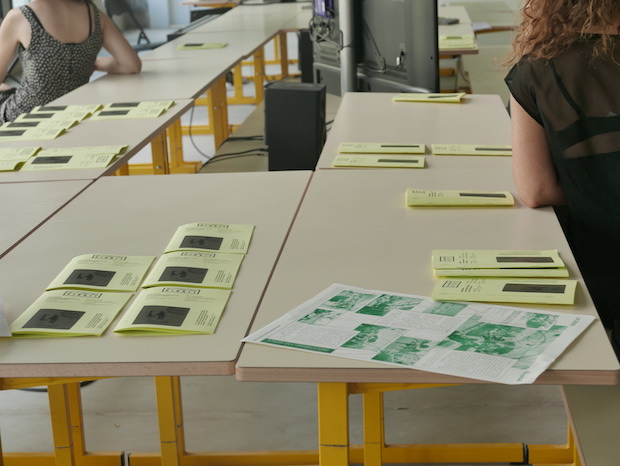
- Study day "Kibrit كبريت On the reactivation of our collective utopias and forgotten narratives" – on Friday, June 23, 2017 at Bétonsalon - Center for Art and Research.
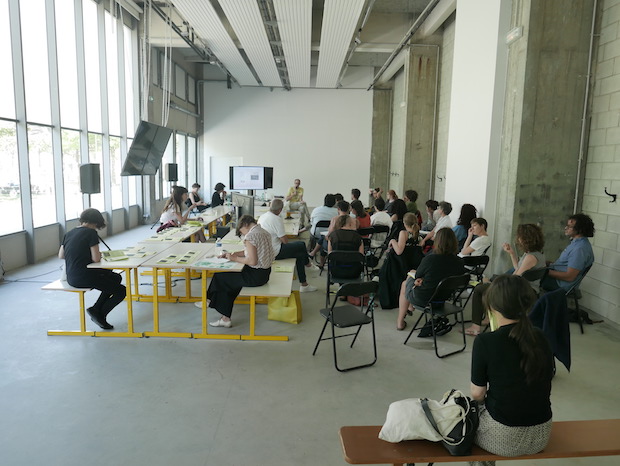
- Study day "Kibrit كبريت On the reactivation of our collective utopias and forgotten narratives" – on Friday, June 23, 2017 at Bétonsalon - Center for Art and Research.
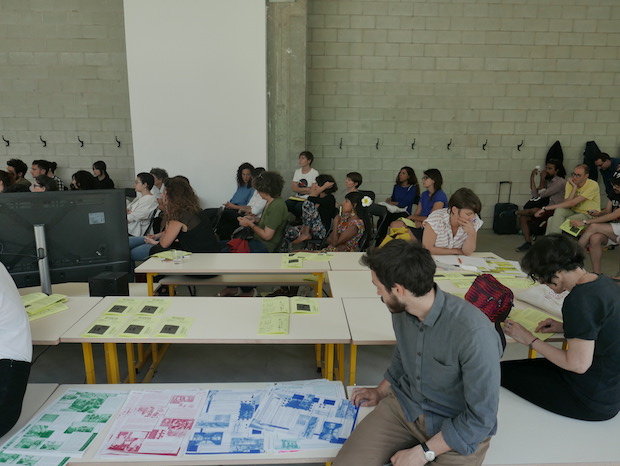
- Study day "Kibrit كبريت On the reactivation of our collective utopias and forgotten narratives" – on Friday, June 23, 2017 at Bétonsalon - Center for Art and Research.
Share